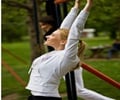Researchers say that exercise can produce healthy chatter between bones, fat and pancreatic cells in humans, thereby helping them in bringing out the best in each other.

It also indicated that blood levels of the hormone osteocalcin, made by bone-producing osteoblasts, might be a good indicator of how things are going in all three areas, said Dr. Norman Pollock, bone biologist at GHSU's Georgia Prevention Institute.
Pollock's finding is some of the earliest human evidence of this crosstalk among the divergent cell types.
"The idea is that bones can possibly sense environmental stimuli such as being physically active or sedentary and dictate energy regulation accordingly," he said.
The reality is bones get bigger and stronger with exercise and they appear to be sharing the good news. "When osteocalcin is released in your blood, that hormone is talking back to the adipocytes, the cells that store fat, and the pancreatic cells that release insulin to improve energy metabolism."
Bone researchers like Pollock have previously believed bones were just listening.
Advertisement
Source-ANI














